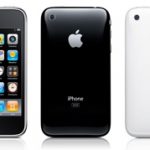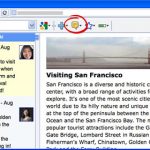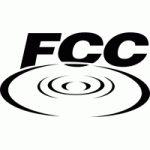Let's start the hundred million Wii countdown!

While the Xbox 360 and PlayStation 3 have gradually had their prices whittled down, and their product SKUs have shuffled no fewer than eight times each, Nintendo's Wii has remained the exact same price with the exact same specs the whole time.
From November 2006 to this very day, Nintendo's never changed the Wii's $249 pricetag.
Intel keeps fighting for widget-augmented TV

At the Intel Developer Forum in San Francisco this week, Intel has devoted a considerable amount of time to a variety of products -- not just netbooks -- that run on Intel Atom processors. Today, the company officially debuted its first Atom-based system-on-a-chip for consumer electronics products such as TVs, set-top boxes, and optical media players.
The 45nm CE4100 system on a chip (formerly codenamed "Sodaville") is backwards compatible with the Intel Media Processor CE3100 (a.k.a., "Canmore") that debuted at IDF last year. That product found its way into a number of HDTVs this year, including Samsung's "Internet@TV" enhanced models. But Intel has been pushing the widget-enhanced Internet TV experience for nearly six years, and it still hasn't caught on. As with its continued advocacy of the Mobile Internet Device (MID) form factor, Intel keeps pushing but few seem to notice.
The smartphone popularity contest: Palm Pre crashes iPhone 3G S' party

Market research firm Interpret, LLC issued a report today that examines the public's mindshare of the market's leading smartphones (iPhone 3G, iPhone 3G S, Palm Pre, Android G1, BlackBerry Storm, BlackBerry Curve). In other words, it gauges the public's perception of particular devices and how "popular" they are outside of actual sales figures.
While observing popularity often just serves to reiterate what many people think they already know about a product, Interpret's report propounds that it is no longer enough for smartphones to just perform advanced tasks, but they must also project certain qualities about their owners. The qualities that people most wanted to say about themselves through their phone were: "hip/cool," "smart," and "productive."
Intel's Moblin platform takes big steps

While Linux-based operating systems have been well-received for netbook form factors, some of the highest-profile distributions have not yet taken a strong hold there, especially when competing against desktop operating systems like Windows XP. One of those not-yet-a-hits is Moblin, an Intel-endorsed open source platform designed especially for Atom-powered devices.
Today, however, Moblin received a couple of big boosts as a result of the Intel Developer Forum going on this week, helping to grow the project's scope considerably.
New Google tool adds a comment section to every Web site

Today, Google launched a new project called Sidewiki, which is a browser sidebar that lets users add footnotes to any existing Web page, even if the main site doesn't allow comments. Sidewiki has been added as a feature on Google Toolbar for Firefox and Internet Explorer, and the team today said they're working on an edition for Chrome, too.
Sidewiki appears as a field on the left hand side of the browser, where users can post contextual commentary. If it's a site paraphrasing a piece of literature and a user happens to have a link to the full text, it can be added there. While it can very easily suffer from "FIRST!" syndrome or serve as a spam advertisement platform, posts are not anonymous. And as Sundar Pichai, VP of Google Product Management and Michal Cierniak, Engineering Lead for Google Sidewiki today said the content will be ranked by quality.
T-Mobile and Clearwire reportedly in early 4G discussions

According to a Bloomberg report yesterday, Deutsche Telekom is in early talks with Clearwire and MetroPCS about 4G development.
The report cites unnamed sources who said that a bid to buy Sprint, as had been previously rumored was highly unlikely. Instead, the sources said Clearwire needs a $2 billion investment by the end of the year to complete its WiMAX expansion, and that Deutsche Telekom could provide that funding in exchange for access to the network.
Sprint opens its network to Android developers

Even though it's only got one Android device in its roster so far, wireless network operator Sprint today announced that it is turning over its network and product services to Android developers through the Sprint Developer Web site's new Android section.
With the Android 1.5 "Donut" SDK update, Android developers gained access to the CDMA telephony stack, where previously only the GSM stack was supported. So now that support for Sprint's wireless network protocol is built into Android, a Sprint developer program will help software developers exploit the "Now Network" and its strengths.
Yet another app store, this time for Intel Atom-based netbooks

The app store bubble continued inflating today, with Intel's announcement of the beta of its week-old Atom Developer Program. It's a system which will ultimately create app stores for netbooks running on Intel Atom processors, irrespective of the operating system.
"The netbook has become one of the most popular consumer devices in the market today, but its true potential has been limited by applications that are not optimized for its mobility and smaller screen size," said Renee James, corporate vice president and general manager for Intel's Software and Services Group, during a presentation at IDF today. "The Intel Atom Developer Program provides a great opportunity for developers to create useful and inventive applications that will unlock a netbook's potential while opening a new sales and distribution channel."
Google Sync brings push Gmail to iPhone, WinMobile, S60

Today, Google has announced that Gmail push updates have been added to Google Sync, the Microsoft Exchange ActiveSync-based tool that lets BlackBerry, iPhone, Symbian S60, and Windows Mobile devices to share calendar entries and contact info with a user's Web-based Google account. The service, which debuted in beta earlier this year, automatically pushed Gmail inbox content to the synched phone's native e-mail reader.
This announcement comes as good news for iPhone users who have, until now, had to pay for push Gmail updates by including it in their MobileMe subscription, or by paying for apps like PushMail or G-Push Mail. But it's also especially unfortunate for Tiverias Apps, makers of GPush for iPhone, an application which received a considerable amount of attention in mid-Summer, but didn't get approved until August, and has only been available in the App Store for a month and a half.
Tiny new module brings embedded mobile broadband to more devices

In March, Ericsson launched an always-on mobile broadband chip for notebooks which could leverage the power of a persistent HSPA/GPRS/EDGE connection on remote security and monitoring features in addition to standard wireless use.
Today at the Intel Developer Forum in San Francisco, Ericsson has announced it has made a similar module that's one third the size, and that consumes 40% less power.
Five reasons why Google's Jaiku is more boring than Twitter

The Helsinki Institute for Information Technology (HIIT) today announced the impending publication of the results of its microblogging study. In a peek forward, the Institute revealed that most respondents using Google-owned "lifecasting" service Jaiku are either very bland, or are not using the service properly.
According to the Institute, the five most common status updates on the service are:
Like HP, Dell also acquires a Perot empire for enterprise services

Though Dell has extended its brand to consumer electronics of all sorts, the company's latest drive is straight into enterprise services, a segment of the IT market which has helped HP retain a competitive edge on Dell in hardware sales.
Today, Dell announced it will be acquiring Perot Systems in a $3.9 billion all-cash transaction expected to be completed in January.
FCC chair lays down groundwork for net neutrality rules

At the Brookings Institution in Washington, DC today, Federal Communications Commission chairman Julius Genachowski discussed the Commission's plans for preserving net neutrality with the addition of two new tenets to the FCC's existing open Internet principles.
"Why has the Internet proved to be such a powerful engine for creativity, innovation, and economic growth?" Genachowski asked, "A big part of the answer traces back to one key decision by the Internet's original architects: to make the Internet an open system."
Windows Mobile + Palm: 2005-2009

During yesterday's quarterly earnings call, Palm CEO Jon Rubenstein confirmed that webOS is going to be the sole operating system coming from Palm as the company goes ahead.
"Due to importance of webOS to our overall strategy, we've made the decision to dedicate all future development resources to the evolution of webOS. Which means that going forward, our roadmap will include only Palm webOS-based devices," Rubenstein said.
Google to FCC: Apple and AT&T lied

The text of a letter from Google to the US Federal Communications Commission dated last August 21 -- the un-redacted contents of which were only made available today -- directly contradicts information given by Apple and iPhone partner AT&T, regarding the apparent rejection of a key Google mobile app from Apple's iTunes App Store.
Google Voice is a beta project which allows several phone lines to be united under a single new number, accessible from any phone. Earlier this year, Google submitted to Apple an app that would make the service usable on the iPhone. The fiasco over Apple's rejection of the Google Voice application from the App Store came to a head when the FCC began a formal inquiry into whether the relationship between AT&T and Apple is fair and encouraging to innovations in communication.
Tim's Bio
Tim Conneally was born into dumpster tech. His father was an ARPANET research pioneer and equipped his kids with discarded tech gear, second-hand musical instruments, and government issue foreign language instruction tapes. After years of building Frankenstein computers from rubbish and playing raucous music in clubs across the country (and briefly on MTV) Tim grew into an adult with deep, twisted roots and an eye on the future. He most passionately covers mobile technology, user interfaces and applications, the science and policy of the wireless world, and watching different technologies shrink and converge.
© 1998-2025 BetaNews, Inc. All Rights Reserved. About Us - Privacy Policy - Cookie Policy - Sitemap.
